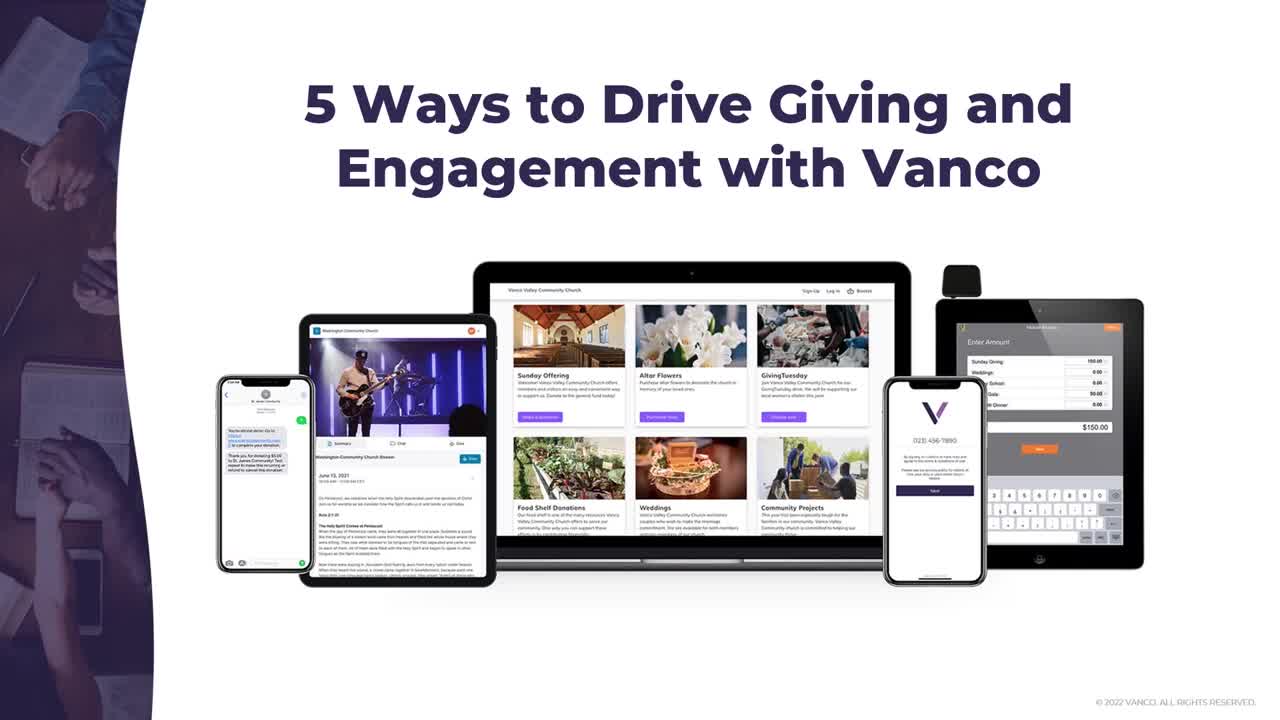
Christian stewardship goes beyond giving and includes how you live each day. The answer to the question, “What is Christian stewardship?” extends past dollars and cents to your daily choices with your time, skills and finances, all in response to God’s call. You’re not just a church member, but a caretaker of what God has entrusted you.
It’s easy to think of stewardship as just a financial topic, but it’s much bigger than that. A 2025 Pew Research Center survey found that 62 percent of U.S. adults identify as Christian. That means millions are navigating what it means to practice biblical stewardship in real life, some with spreadsheets, others with prayer (or both).
Table of Contents
- The Biblical Foundation of Stewardship
- Why Christian Stewardship Matters Today
- Practical Examples of Stewardship in Churches
- Tools That Support Faith-Based Stewardship
- How Vanco Helps Put Stewardship into Action
- FAQs
The Biblical Foundation of Stewardship

If you’ve ever wondered what stewardship in the Bible means, you’re not alone. A lot of people hear the word and immediately think about money. However, biblical stewardship goes far beyond tithing or church budgets. It’s about responsibility and recognizing that everything you have isn’t yours. It’s God’s and he’s trusting you to take care of it.
Stewardship in Scripture: key verses and meanings
The Bible doesn’t just mention stewardship; it builds an entire way of life around it. Psalm 24:1 says plainly: “The earth is the Lord’s and everything in it.” That includes your finances, yes! But that means everything you have – your time, skills, influence and resources.
The opening chapters of Genesis lay the groundwork for this. God placed Adam in the garden with a job: to tend and care for it. That wasn’t just about agriculture. It was about responsibility. Later, Jesus doubled down on this idea in the parable of the talents (Matthew 25:14-30), making it clear that what you do with what you’ve been given matters.
God’s ownership and our role as caretakers
Once you realize that God owns everything, your perspective shifts. You stop asking, “How much of my time should I give to God?” and start asking, “How does God want me to use all my time?” That’s a big difference. Managing God’s resources isn’t just about donating money; it’s about making sure your choices reflect his priorities.
It’s easy to compartmentalize stewardship, but in reality, it affects everything:
- Your career
- Your relationships
- How you handle stress
These are all areas where God has given you something to manage. How are you doing with that on a daily basis?
Stewardship beyond finances: time, talent, treasure
Churches talk a lot about giving financially and for good reason. Nonetheless, Christian financial principles extend to more than just writing a check. Some people are blessed with wealth, while others are rich in time or skills. Stewardship is about using what you have, not just what’s in your bank account.
Think about the people who keep your church running:
- Worship leaders
- Outreach coordinators
- Tech team members
- And more!
They’re practicing stewardship and generosity by offering their time and talents. Even something as simple as mentoring a younger believer or serving coffee before service is stewardship.
Why Christian Stewardship Matters Today
Stewardship isn’t the most exciting topic at first glance. It sounds like one of those churchy words that gets tossed around in sermons but rarely explained in a way that sticks. However, here’s the thing: stewardship and generosity are at the heart of a thriving faith community.
Cultivating a culture of generosity
People want to give to something meaningful. They don’t just drop money on the offering plate out of obligation; they give because they believe in the church's mission. The problem? If generosity isn’t encouraged, it won’t just magically happen.
That’s why churches that focus on Christian giving principles see a more engaged congregation. Giving isn’t about guilt or pressure; it’s about helping people connect their faith with their finances in a natural and fulfilling way.
A genuinely generous church does give financially, but it also encourages giving time and talents. Some people may never be able to write a big check, but they’ll:
- Show up early to set up chairs
- Serve meals
- Mentor younger members
That’s stewardship too, and when churches recognize and celebrate all forms of giving, people feel valued and more willing to participate.
Strengthening trust and accountability
Nothing makes people stop giving faster than feeling like their money is disappearing into a black hole. Faithful financial management isn’t about showing off spreadsheets; it’s about transparency so people feel confident in their giving.
With over 160 million Americans involved in a congregation, churches collectively manage a staggering amount of resources. Trust grows when leaders clearly communicate where the money goes and why it matters. Churches that provide regular updates, celebrate milestones and explain financial decisions in simple terms are the ones that see long-term generosity.
Building spiritually and financially healthy churches
A church that embraces the biblical view of stewardship doesn’t just survive; it flourishes. Stewardship is about wisely using what God has provided so the church can continue its mission for years.
When people see their giving making a real impact, whether funding a community outreach program, supporting missions or keeping the church building in good shape, they stay engaged and excited about being part of something bigger than themselves.
Ultimately, stewardship centers on creating a church culture where giving through finances, time or skills feels natural, joyful and deeply connected to faith.
Practical Examples of Stewardship in Churches
Managing church funds responsibly
Handling church finances isn’t the most exciting part of ministry, but it’s one of the most important. People want to know their tithes and offerings are managed wisely and transparency goes a long way in strengthening that trust:
- A well-planned budget
- Clear financial reports
- Routine financial reviews
These show your congregation that their generosity is making a difference.
Some churches take financial stewardship a step further by investing in long-term sustainability. The Community Lighthouse Project in New Orleans is a perfect example; churches installed solar panels and backup batteries so they could serve as emergency centers during power outages. That’s responsible fund management in action, and a great example of turning donations into a lasting impact for the congregation and the community.
Encouraging regular tithes and offerings
Talking about giving can be awkward, but it doesn’t have to be. People don’t need a guilt trip; they need to understand why consistent giving matters. When members see how their contributions support everything from mission trips to children’s ministry, they’re more likely to give regularly.
Of course, life is busy. People forget to bring cash or write checks; before they know it, another Sunday has passed. That’s why churches that offer digital and recurring giving see much higher participation rates. The easier you make it for people to give, the more they’ll embrace it as part of their faith journey.
Involving members in volunteer service and giving
Churches don’t run on finances alone. Time and talent matter just as much. From leading worship to helping with community outreach, every role keeps the church strong. When members actively serve, they develop a deeper connection to their faith and their church family.
This aspect is where biblical stewardship comes full circle. When people see their time, money and skills making a difference, giving isn’t something they have to do; it’s something they want to do and that’s the heart of proper stewardship.
Tools That Support Faith-Based Stewardship
Churches run on generosity. Faith-based stewardship is about using every resource wisely, whether financial gifts, volunteer time or shared talents. However, managing those resources can be overwhelming. That’s where the right tools come in, making it easier for your church to stay organized, transparent and financially healthy.
Digital giving tools like Vanco
If your church still relies solely on passing the plate, it might be time to rethink your approach. People don’t carry cash like they used to and online giving isn’t just a convenience; it’s a necessity. Vanco helps churches create a seamless giving experience through one-time gifts, recurring donations or mobile giving.
Even better, Vanco integrates with ACS, Ministry Platform and Church Windows, which means no extra work for your financial team. Donations are automatically recorded, reports generate themselves and your church gets a clear picture of giving trends with less manual data entry and more time for ministry. Everyone wins.
Reporting and donor transparency
Church members want to know if their gifts are making an impact. Transparent financial reporting goes beyond good practice and builds trust. With Vanco, you can easily share giving reports, send year-end statements and keep donors informed without sifting through spreadsheets.
Having a system in place for church resource management also means fewer awkward conversations about money. No one enjoys those. Instead, members can see how their generosity fuels the mission, and that clarity encourages greater participation.
Helping members give consistently and with purpose
If there’s one thing that makes a difference in stewardship and generosity, it’s consistency. Recurring donors give twice as much as those who give occasionally. Not because they’re wealthier, but because they’ve made giving a habit, and habits are powerful.
Vanco’s tools make it easy for members to set up automatic donations so they don’t have to remember each month. It’s a small change that has a massive impact on church finances.
Are you curious about how digital giving is shaping churches? Vanco’s benchmark study surveyed 1,000 churchgoers to uncover giving trends, donor motivations and best practices. If you want to strengthen Christian giving principles in your church, this data is worth a look.
How Vanco Helps Put Stewardship into Action
Managing faith-based stewardship well means ensuring donations are handled responsibly, church finances stay transparent and members feel confident their giving is making an impact. That’s where Vanco makes life easier.
Overview of Vanco’s solutions for churches
You don’t need more spreadsheets, manual tracking or awkward Sunday morning reminders about tithing. Vanco’s digital giving platform takes the stress out of staying on top of church resources management, making it simple for members to give whenever and however they feel led.
It could be online, text, mobile app or in-person – whatever works best for them and for you. Automatic tracking, seamless reporting and integrations with church management tools like ACS, Ministry Platform and Church Windows.
Want to see how it works? Watch this quick video:

Key features that support faithful money management
When it comes to Christian giving principles, some of the key elements are consistency, transparency and, yes, a little bit of ease. Vanco allows you to:
- Automate recurring giving so your congregation doesn’t miss a beat.
- Keep track of donations with clear, accurate reporting.
- Integrate seamlessly with church management systems like ACS, Ministry Platform and Church Windows.
- Offer flexible giving methods that meet your community where they are.
- Have the confidence of working with a PCI Level 1 service provider, meaning the highest protection level backs your financial data. It’s like having a vault, but it's way more convenient.
Check out all the features Vanco offers here.
Connect With a Giving Coach
Stewardship is personal; sometimes, you need a little guidance to ensure everything aligns with your church’s unique mission. Vanco’s giving coaches are ready to help you get the most out of your financial tools and take your faithful financial management to the next level. Connect with a coach today.
FAQs
Q1: What is Christian stewardship?
Christian stewardship is about recognizing that everything you have – your time, talents and treasures – are gifts from God. It’s your role to manage these gifts responsibly, using them to serve others and honor Him. It’s not just about giving money, but about living a life that reflects gratitude and care for what’s been entrusted to you.
Q2: What does the Bible say about stewardship?
The Bible paints stewardship as a sacred responsibility. Psalm 24:1 reminds us that everything belongs to God. As caretakers, we’re called to manage resources wisely, embracing a biblical view of stewardship that includes more than just dollars and cents.
Q3: Is stewardship only about money?
Christian giving principles extend far beyond finances. Stewardship includes offering your time and abilities, too — helping others, serving your community and living intentionally.
Q4: How can churches teach stewardship?
Churches can teach stewardship by leading with example, offering practical tools for faithful financial management and creating opportunities for people to serve. A balance of teaching and action can foster a culture of giving beyond just money.
Q5: What tools can help churches practice better stewardship?
Tools like Vanco’s online giving platform help streamline church resource management, making giving easy, transparent and consistent. They make it simple to track donations and encourage stewardship and generosity in ways that connect with today’s tech-savvy congregations.
Get the Free eBook to Improve Church Stewardship
Keeping the lights on, the doors open and missions funded aren't what inspired most church leaders to pick their careers, but they are key to the health of each church and congregation. Discover how to become a master of church stewardship with our ultimate guide.











